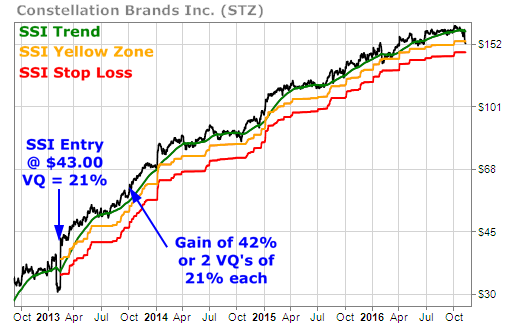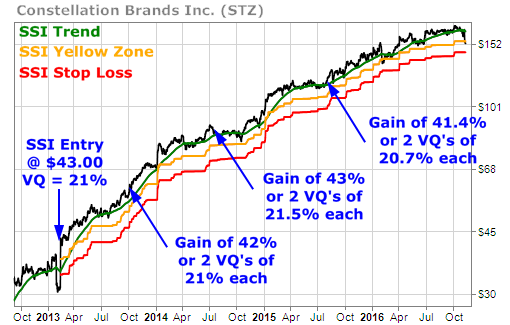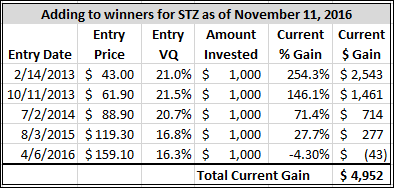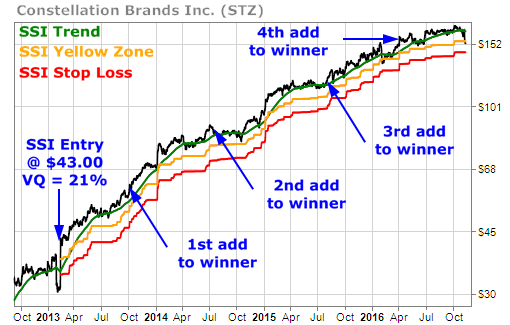Doubling down on losing positions is a common strategy amongst average investors. The thinking is usually that buying more shares at a lower price will help get the position back to “break-even” faster.
Thinking about “doubling down” got me wondering … is there ever a good time to double up on a winner?
Developing a smart strategy for helping TradeStops subscribers add to their winning positions is a topic that has been on my mind for years now. Today, I have the beginnings of such a strategy to share with you.
The question I put to my research team was, “When is a good time to add to a winning position?” The answer we’ve come up with is, “After 2 VQs.”
I’ll start by illustrating with an example.
Constellation Brands (STZ) is a stock that could be the poster child for TradeStops. I’ve written about it many times before. This stock has been in a nearly uninterrupted uptrend now since early 2009 when it traded for about $10 per share. Today STZ sits above $150 per share … and it’s been a smooth ride all the way up.
STZ last triggered an SSI Entry signal back in February of 2013. At the time, STZ was trading for about $43 per share, and the VQ on STZ was 21%. What I mean by “after 2 VQ’s” is that we would look to add to our position in STZ once it had risen about 42% (that’s 2 x 21%) to $61.
The following chart will show you what I mean.
(Note that I’ve used logarithmic scaling for the price axis so that equal vertical distances represent equal percentage gains. From $30 to $45 is a 50% gain. From $45 to $68 is another 50% gain. Etc. It helps make the VQ% moves look more equal.)
Using this approach, we would have added to our original position in STZ when we got a gain of 42% from our original entry. Again, since the VQ on STZ was 21%, a 42% gain is a 2 VQ move. This happened on October 11, 2013 – about 8 months after our original entry.
At the time, STZ was trading for $61.90 per share and now had a VQ of 21.5%.
Following the same logic, we would next consider adding to our position in STZ if and when it rose another 2 VQ’s from our last entry point – i.e., 2 x 21.5% = 43% from $61.90.
I know that’s more math than some of you may feel comfortable with. I appreciate you bearing with me. I feel obligated to spell out all the details for those that want to be able to exactly reproduce what I’m suggesting.
Here’s how the next couple of steps look on our chart.
Are you starting to get the idea?
Here’s a table showing all of the individual trades in STZ using this strategy, including what the new VQ was at the time of each new trade.
Our initial investment at the first entry signal on STZ was $1,000, and we added another $1,000 each time that the position gained another 2 VQs from the previous entry point. Using this approach, an investor in STZ would currently be sitting on a gain of $4,952 vs. a gain of only $2,543 from the original $1,000 investment.
Here are all the entry points on the final chart.
Alright. Now that you, hopefully, understand how this method works, let me briefly share with you why we settled on it.
First off, a gain of 2 VQs is a nice round number … and our brains like nice round numbers. Round numbers make sense to us. We feel more comfortable with them. A stock that is already up 2 VQs has a solid gain. It’s demonstrating strength. We’ve got some profits to play with.
Second, if the stock starts falling right after this initial 2 VQ gain and after adding to our winner, we’ll still end up with a net profit even if we get stopped out without any more gains.
Finally, and most importantly, is that we back-tested this “add to winners after 2 VQs of gain” strategy, and we found that we made about 50% more net profit across all of our trades … and we did so without lowering our win percentage and without taqking on extra risk.
I’m excited about this new research and will be digging into it more in the weeks and months ahead. I’ve long suspected that a strategy for adding to winners would be a very valuable one for individual investors. It looks like we’re onto something,
TradeSmith Research Team





